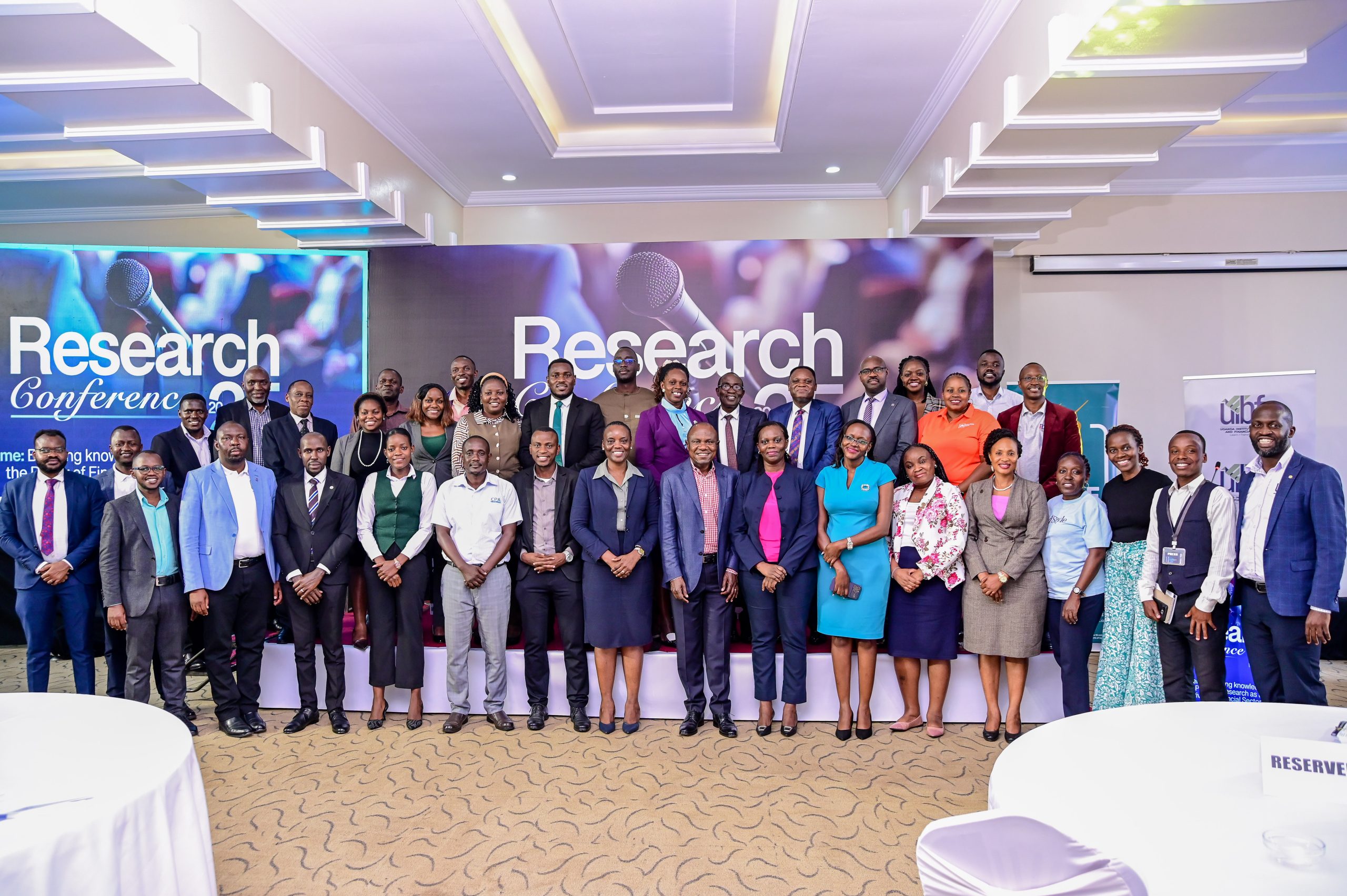By Ritah Namisango and Julius Tukacungurwa
August 22, 2025: The Uganda Institute of Banking and Financial Services (UIBFS) and the School of Business at Makerere University, have cemented their over ten-year collaboration, with a research conference to discuss the role of research in driving financial sector transformation.

Both entities, have stakes in the delivery of the Master of Arts in Financial Services (MAFS), including curriculum development and review, ensuring that the program addresses the needs and demands of the financial sector.
Bringing on board, government, industry stakeholders, researchers, policy makers, the private sector, academia and students, the 2025 research conference, provides a platform to bridge the gap between knowledge and practice in the financial sector.
By knowledge sharing, networking, and collaboration, the research conference sought to advance banking practice and provide opportunities for researchers to gain recognition and publish their work.
The research conference has set the pace for more joint research activities involving the academia, financial industry players, and the banking sector. In line with this goal, the Minister of State for Finance, Planning and Economic Development, Hon. Henry Musasizi launched the UIBFS Research Fund, Research Agenda, and a book of abstracts.
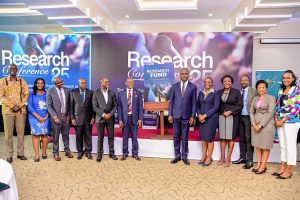
The book of abstracts is testimony to the collaborative efforts between Makerere University College of Business and Management Sciences (CoBAMS) and the Uganda Institute of Banking and Financial Services (UIBFS) featuring research on the financial industry. The book’s contents demonstrate the potential for research to drive positive change in the financial sector.
Speaking at the unveiling of a new research agenda and students’ book of abstracts, the Minister stressed the urgent need for evidence-based solutions to drive Uganda’s economic transformation. Hon. Musasizi observed the impact of digitalization on the global financial sector. “The financial sector all over the world is central to our country’s development,” he stated, pointing out its role in mobilizing savings, fueling entrepreneurship, and driving industrialization.
He observed that the financial sector is evolving rapidly under digitalization which has accelerated expectations for efficiency, transparency and inclusion, but not forgetting the possible risks.
The Minister posed a thought-provoking question on the future of traditional banking roles, asking, “Does the future need tellers? I went to a certain bank in the UK. I never found any teller. That is where digitalization has taken a whirl.” He urged researchers to anticipate these changes, including potential job displacement, to ensure the sector remains relevant and competitive.
Hon. Musasizi directly linked the research initiative to Uganda’s Vision 2040, aiming for a US$500 billion economy through the 10-fold growth strategy. “Today’s research agenda contributes directly to this goal, helping us translate knowledge into action for sector transformation.” He affirmed the government’s sustained support for research through initiatives such as the Research and Innovation Fund, empowering universities and institutions to generate practical solutions.

In his remarks, the Vice Chancellor of Makerere University, Prof. Barnabas Nawangwe acknowledged the vital role of collaboration with institutions such as the Ministry of Finance, Planning and Economic Development, and the Institute of Banking and Financial Services. He noted that banking will be critical in ensuring that Africa remains stable, given projections that half of the world’s population will reside in Africa in the next 50 years.
Focusing on the times ahead, the Vice Chancellor of Makerere University, Prof. Barnabas Nawangwe revealed critical challenges facing Uganda and Africa, including a looming unemployment crisis where ‘in the next 5 years, we will have over 5 million people on the streets looking for jobs.’ He also cited rapid population growth and climate change. He asserted that research holds the key to developing solutions, such as provision of drought-resistant crops and increased yields. “Without research, we are not going to achieve the ten-fold growth of the economy,” he stated. He reported that Makerere University plans to establish a dedicated science and technology center to foster innovation and job creation. He expressed enthusiasm for a joint research agenda aimed at finding solutions for these pressing issues.
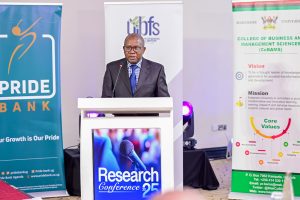
Representing the Governor, Mr. David Kalyango, Executive Director of Bank Supervision at Bank of Uganda (BOU) asserted that a robust synergy between academic knowledge and practical application is crucial for Uganda’s financial sector transformation. He described this essential connection as the very compass that guides our future, observing that sustainable transformation emerges from a powerful blend of practice and knowledge.
The Bank of Uganda’s revised strategic plan for 2022-2027 aims to promote a conducive economic environment for Uganda’s sustainable growth, a commitment demanding evidence-based policy, rigorous analysis, and innovative thinking. The plan has four high-impact goals—ensuring low and stable inflation, ensuring exchange rate stability, promoting a stable and resilient financial system, and supporting sustainable economic growth.
Mr. Kalyango acknowledged a persistent chasm between theoretical models and the practical challenges faced by financial institutions, resulting in transformative research often remaining confined to journals. To bridge this divide, he called for joint research projects, enhancing communication to translate complex findings into actionable insights, and creating shared spaces where academics, regulators, and bankers can co-create solutions in real time.
Mr. Kalyango identified critical research frontiers, including the digital transformation’s impact on credit access and emerging cyber risks, the (ESG imperative) for developing local metrics and integrating climate risk, and deepening financial inclusion by understanding persistent obstacles. Furthermore, he cited the need for insights into Monetary Policy Transmission, particularly, to establish why commercial banks’ lending behavior often deviates from the central bank rate announcements, a phenomenon requiring careful study.
KEYNOTE ADDRESS
On behalf of the Board Chair, Uganda Institute of Business Financial Services, Wilbrod Owor, asserted that banking and financing have undergone substantial changes, rendering traditional models obsolete. “If you use models of the past and are not updating yourself with research, the world would have left you,” he emphasized.
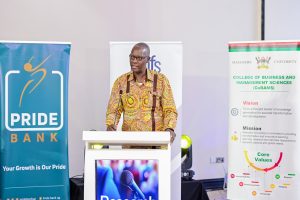
Mr. Owor stressed the importance of understanding new dynamics, such as mobile money transactions, which have revolutionized business operations. He highlighted the example of market vendors making large transactions via mobile money at dawn, which demonstrates the need for financial institutions to adapt to these changes.
The financial sector’s ability to channel credit to emerging sectors, such as social media, entertainment, and event management, depends on its capacity to understand and harness these new dynamics. Mr. Owor pointed out that research is critical in driving growth and development, enabling financial institutions to identify new opportunities and develop innovative products.
Mr. Owor advocated for partnerships and collaboration to leverage each other’s strengths and drive progress. He believed that research should be mainstreamed in the financial sector’s DNA, informing decision-making and driving innovation.
COLLABORATORS REMARKS
The Dean of the School of Business, Associate Prof. Godfrey Akileng, represented by Dr. Martin Bakundana, expressed gratitude to the Uganda Institute of Banking and Financial Services for its continued involvement in internal curriculum review programs and public lectures. He noted that the partnership has led to a significant shift in approach, with a focus on practical, industry-focused, and transformative research.
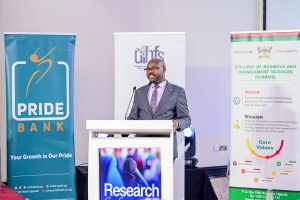
The collaboration has given birth to a research agenda aimed at bridging the gap between academic research and industry needs. Dr. Bakundana affirmed that the School of Business will be available to provide expertise and services to support the research initiative, with the ultimate goal of informing policy shifts at the Central bank, Ministry of Finance, and other sector players.
The partnership is timely, since the financial services industry is going through a transition driven by technological innovation. Dr. Bakundana reinforced the importance of staying up-to-date with global trends and leveraging each other’s strengths to achieve common goals. “The School of Business is committed to working with the UIBFS to deliver results that will have a tangible impact on the financial sector in Uganda, “he said.
On the other hand, the Uganda Institute of Banking and Financial Services (UIBFS) has taken a significant step in launching its Research Fund, marking a new chapter in its journey to become a hub of innovation, learning, and sector-wide collaboration. According to Ms. Goretti Masadde, the institute’s CEO, this initiative signals a collective commitment to supporting research that addresses real-world challenges.
The theme of the conference, “Bridging Knowledge and Practice: Research as a Driver of Financial Sector Transformation,” brings attention to the importance of applying research findings in practice.
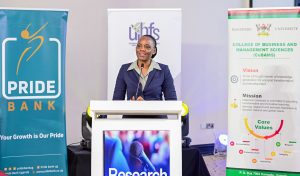
Ms. Masadde observed that research must move beyond theory and inform decision-making, innovation, and growth in the financial sector. “In today’s fast-paced financial landscape, shaped by digital finance, artificial intelligence, and climate change, research is crucial for driving transformation,” she stated.
Ms. Masadde called on industry stakeholders to not only fund research, but also apply its findings to inform policy, product design, risk management, and financial inclusion. The partnership between academia and industry is critical in building a knowledge-driven ecosystem that nurtures capacity, unlocks innovation, and prepares the next generation of financial professionals.
LAUNCH OF RESEARCH AGENDA AND A BOOK OF ABSTRACTS
According to Dr. Diana L.K Ssekiboobo, a Lecturer at CoBAMS and Assistant Coordinator for graduate studies at the School of Business, the book of abstracts showcases research spanning various areas of the financial industry, making it relevant to a wide range of stakeholders. Dr. Ssekiboobo noted that the abstracts are written by students, mostly from the Master’s program, and have undergone a rigorous review process to ensure their quality.

The book aims to contribute to informed decision-making in academia, policy, and industry by bringing together research findings and insights. Dr. Ssekiboobo illustrated the importance of this collaboration, highlighting that the research presented in the book can help stakeholders find solutions to real-world problems and inform policy decisions.
In addition, the Uganda Institute of Banking and Financial Services (UIBFS) launched a research fund to support studies that address practical challenges in the financial sector. According to CEO Goretti Masadde, the institute’s research agenda is built on a four-pronged approach: funding PhD research, conducting annual problem-based research, industry-initiated research, and market research.
The research fund will provide grants for PhD studies, applied research, and market surveys, with a focus on transparency, accountability, and alignment with strategic priorities. The institute expects the research to have a tangible impact, including evidence-based policy-making, actionable insights for financial institutions, and market intelligence for decision-making.
The implementation strategy involves collaboration with industry stakeholders, a dedicated research team, and capacity building for researchers and industry staff.
Ms. Masadde called on industry stakeholders to sponsor and collaborate on research, build capacity of industry staff, and incentivize them to participate in the research agenda. She also encouraged researchers, students, and financial institutions to participate and utilize applied research to drive financial sector transformation.
PANEL DISCUSSIONS
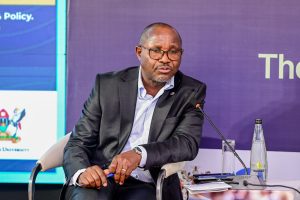
The panel discussion on “Translating Financial Research into Market Applications” provided valuable insights into the role of research in driving business decisions and innovation in the financial sector. Dr. Fabian Kasi, Managing Director – Centenary Bank, stated the significance of research in understanding customer needs, staff satisfaction, and market trends. He revealed the bank’s efforts to conduct annual surveys to gauge customer satisfaction and staff motivation, and to use research to design products and services that meet the evolving needs of customers.
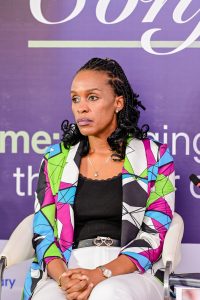
Ms. Mona Muguma Sebuliba, CEO of aBi Financial Ltd, shared how research has driven the company’s mission to address access to finance for agribusinesses and smallholder farmers. She cited the example of Finscope research, which shows the underfunding of the agriculture sector, and how this data-driven insight led to the creation of ABI Finance. Ms. Sebuliba stressed the importance of using research to inform decision-making and to develop targeted solutions that address specific challenges in the financial sector.
The panelists agreed that research doesn’t have to be sophisticated to be useful, and that readily available data can provide immediate insights into what needs to be done. However, they acknowledged the need for deeper research to understand complex issues, such as sustainability and return on investment.

Mr. Joseph Lutwama, Director of Programmes at FSDU, discussed the potential of AI in disrupting the way research is conducted and the need to build internal capacity to compete with external consultants.

Ms. Doreen Rubatsimbira, Ag. Director Research and Policy at the Bank of Uganda noted that regulators, by design, hold vast amounts of valuable data and called upon researchers to tap into this resource by pursuing studies in areas of mutual interest.
She further highlighted the need for strategic research in emerging areas such as digitalization, climate change, and the 10-fold growth program.
She also underscored the importance of fostering joint collaborations between academia and practitioners to ensure that research remains practical and impactful.
PANEL TWO
The panel discussion on topic “Bridging the Gap: How Financial Institutions and Universities Can Enhance Collaboration” centered on bridging the gap between theoretical knowledge and practical skills, driving innovation and economic growth. Dr. Nicas Yabu, Principal of the Bank of Tanzania Academy, observed that there’s a disconnect between the theoretical knowledge provided by universities and the practical skills required by the financial industry. He revealed that universities often focus on theoretical knowledge, while the industry looks for practical skills and solutions. This disconnect can lead to graduates being unprepared for the workforce, and financial institutions having to invest time and resources in training them.

Dr. Nicas Yabu discussed the importance of research in informing policy decisions. He noted that the Bank of Tanzania has conducted research on topics such as cryptocurrencies and financial inclusion, and that this research has informed policy decisions. He underscored the need for research to be relevant and applicable to the industry, and for policymakers to work closely with researchers to ensure that research findings are translated into policy actions.

Dr. Mary Kansiime, Director of Professional Development at the Uganda Institute of Banking and Financial Services (UIBFS), stressed the importance of practical skills in the financial sector. She noted that UIBFS is working to address this gap through its training programs, which focus on providing students with hands-on experience and practical skills that are relevant to the industry.
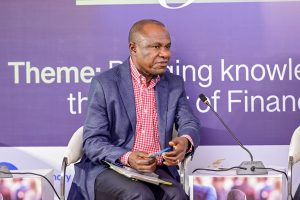
Associate Professor Eria Hisali, from Makerere University, highlighted the need for mutual benefit in collaborations between universities and financial institutions. He explained that for collaborations to be successful, both parties need to benefit from the partnership. This can be achieved through joint research projects, student attachments, and other forms of collaboration that provide value to both parties.
The panelists noted that there are challenges in collaboration between universities and financial institutions, including different priorities and expectations. They noted that financial institutions often prioritize short-term solutions and profitability, while universities may focus on long-term research and theoretical knowledge.
The partnership between the two institutions aims to drive innovation, inform policy, and contribute to Uganda’s economic growth. With a focus on practical skills, mutual benefit, and collaboration, the conference marked a significant step towards achieving the country’s ambitious economic goals.
Julius Tukacungurwa, contributed to this article as a Guest Writer and Journalist from Umoja Standard online media.

